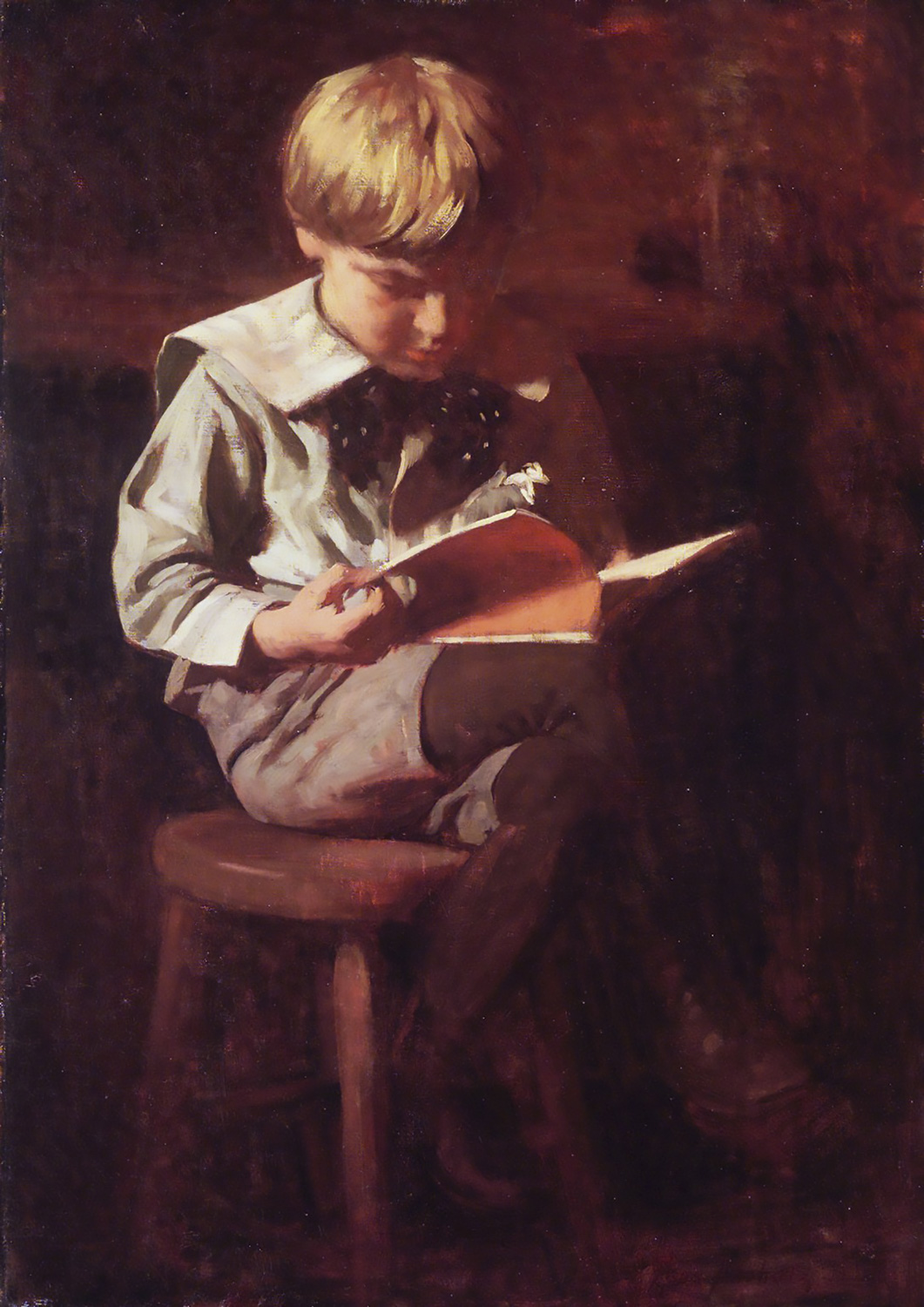Teaching Greek
to Children
in a dumbed-down world


Dr. Nadya Williams
Few expressions in English irk me as much as “it’s all Greek to me.” Baked into the very idiom of our language is this assumption that certain subjects of study are just too difficult for most humans. By implication, we shouldn’t bother with them. This mindset, visible all around in such measures as the increased reliance on AI-designed tools (for which, needless to say, such things as Greek are not too difficult), fosters a dumbing down of our own intellectual lives, right alongside those of our children. Overall, we are all living together in an increasingly dumbed-down world, in which we are afraid of doing things we perceive as too hard — whether it be learning languages, reading books that are old and/or long, or acquiring new skills that require more than a few minutes of effort.
“It’s all Greek to me” is the quintessential rallying cry for this dumbed-down world, a world where you can give up before you even begin. It is a world hostile to learning — and proud of this hostility, wearing the scarlet “I” for Ignorance as a badge of honor rather than a mark of shame. Ignorance in this upside-down world has been transformed suddenly into a virtue.
Despite the naysayers, however, it is freeing to remember that you can actually just do what you want. You do not have to go along with the status quo. And if you are willing to give things that interest you a try, you may find that some of the things that others consider to be too difficult to learn are actually fully within your grasp. At stake is not only intellectual growth — your own and that of your children — but also the potential to grow in such virtues as patience, hope, and love. As it happens, the study of Ancient Greek is a great case study for illustrating this reality in action.

At stake is not only intellectual growth — your own and that of your children — but also the potential to grow in such virtues as patience, hope, and love.

This year, my fifth grader is completing his third year of studying koine Greek, the dialect of Ancient Greek used in the New Testament. We are using a three-year introductory sequence designed specifically for elementary-aged kids. The curriculum has short lessons for five days per week, and the fifth day is always review. The pacing of the curriculum is not only manageable and straightforward but is also a wonderful reminder that you really can fill a bucket with a teaspoon — so long as you keep at it over time.
True, there is one key disclaimer I must make in my family’s case: I hold a doctorate in Classics, which means that I myself have spent much of my life studying Ancient Greek and Latin and the literature and history of the people who originally used these languages. Yet while perhaps this background gave me the confidence to consider teaching these languages to my homeschooled children, there is also the reality that in any course of study, the student must “own” the subject matter — the teacher can only go so far.
As things have turned out, ownership has been the defining theme in my middle son’s study of Greek. While I had assumed when we started the first year of Greek that I would need to introduce each day’s lesson to my son, very quickly he took the initiative for himself. Now, as we near the end of year three, I review his written work and talk about new concepts with him on occasion, but much of the time he is very excited to figure out new lessons on his own and he now consults me only if he has questions. The measured pace of the curriculum has given him a new degree of boldness, a comfort with his ability to figure this out for himself, master it, and then proudly present the results to his mother.
Are such autodidacts in the old-fashioned mode born or made? It is a difficult question, since as with all other things in childrearing, there is no control variable. We have no way of knowing what this particular boy might have been like, had he been raised in a different environment. Perhaps his natural desire to learn would have prevailed regardless. Yet the opportunity our homeschool has provided to discover things for himself has certainly allowed him to grow in these inclinations, reminding us that the environment we foster in our homes matters, and so do the expectations we set for ourselves and our children.
For millennia since antiquity, the study of Greek had been the hallmark of good education, and I am seeing why. Sure, we could talk about the incredible riches of literature written in ancient Greek, or the value of studying inflected languages for understanding the grammatical structure of the English language as well, or we could just brew some tea and talk about the value of studying the good, the true, and the beautiful, which (in my mind) the study of Greek so perfectly exemplifies. We are formed both intellectually and spiritually by the subjects we study, the books we read, the attitude we bring to education — our own and that of our children. If we are surrounded by beauty — even a beauty that requires much work to appreciate — we grow to love it more. I think this describes, at least in part, the relationship of my son with the study of Greek.
Over the past few years, I have heard numerous discussions in the higher education world of the growth mindset versus the fixed mindset. The concept is no less pertinent to other realms than higher ed — from business to, of course, elementary education and lifelong learning. What does this mean? In a nutshell, the idea is that the capacity to learn is, to a large extent, “in your head.” Those who possess a growth mindset believe that they can learn a new skill or subject, and so they do. Those who have a fixed mindset, by contrast, may have the same IQ as someone with a growth mindset, but without the firm belief that one really can learn something, the learning may not happen at all or will be significantly hindered.

Those who possess a growth mindset believe that they can learn a new skill or subject, and so they do.

Of course, we should keep in mind the natural limits that we all haven — and the differences between the natural limits that we all have. Just as each of us is unique in particular gifts, intellectual and otherwise, so is each of us unique in limits. Not everyone is equipped to master calculus, and not everyone is equipped to master Greek. Yet our ability to learn things can nearly always be enhanced by embracing the growth mindset. And that is precisely the mindset I see in so many homeschooled children (especially), including my own.
What if no one ever told you that long books are difficult to read? Or what if no one ever told you that Greek is difficult to learn? Or what about learning to play chess or how to cook or play the piano? When we foster the growth mindset in our homes as the default by which we live, we can organically create an environment where children and adults alike feel encouraged to try learning something new without being prejudiced in advance by the fear that it might be difficult.
As it happens, this mindset may be easier to foster than we expect. If it is supported by bypassing excessive use of electronics, it is also certainly cheaper. My husband and I have never owned a television and have found it best not to try to keep up with all the latest devices. While we have work laptops, our kids have limited access to them. Our home, rather, is packed to the brim with books. And so, the kids read—long and increasingly longer books, and ones that are old, too. Some are millennia old, such as the Homeric epics and the Bible. Others are only moderately old, and are more in the category of modern classics, such as the works of C. S. Lewis or Astrid Lindgren. In such older books lies much richness that is missed if we stick only to the new. And such a bookish environment, we hope, leads to openness and creativity rather than fixed ways of thinking.
Perhaps the best way to encourage the growth mindset is to surround our children and ourselves with edifying activities and possibilities. And so, as a family, we resist the dumbing down of education and the culture around by engaging in things that are lasting, beautiful, and maybe are difficult — but we do not use this last descriptor for them. Instead, we try to foster consistency — that building block of the virtue of patience. Fifteen minutes of Greek a day adds up to mastery of basic Greek grammar after three years. Fifteen minutes of piano practice a day is sure to add up to basic proficiency after a few years. And in my own life over the past four years, approximately an hour of writing on many days had added up to three books and countless essays so far. The dumbed-down world may express its confidence in the intellectual ability of machines over people, but such confidence does not reflect truth.
Resisting the dumbed-down world by persisting in our intellectual growth, day in and out, is not just an act of patience, but one of hope and love. What could be more hopeful than continuing to study something new for three years, all with the confidence that over time, all of those words memorized and sentences translated will bear fruit? Such activity is, at the theological level, a recognition of our nature as created in God’s image, a nature by which we are called to love God with our mind, as well as heart, soul, and strength. It is a life of joy and delight in beauty and the possibility of discovery of yet more beauty that could enter our lives — because there is always more.
And it could all begin by teaching your child Greek.

